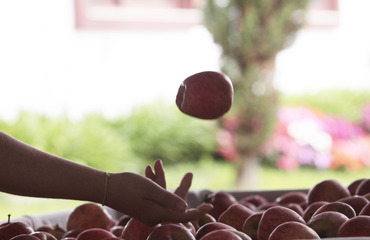São Paulo – In a few days, the first batch of apples from Brazil’s 2017 crop season, whose harvest began a few weeks ago, will get shipped out. The cargo’s destination will be the United Arab Emirates, one of the Middle East countries that Brazil sells apples to on a daily basis.
In the past, the Middle East accounted for as much as 10% of apple exports from Brazil, according to Moisés Albuquerque, CEO of the Brazilian Apple Growers Association (ABPM). “Saudi Arabia, United Arab Emirates, Kuwait and Oman are some of the top Arab destinations,” he says.
The ABPM does not estimate its sales per country, but it believes 70,000 to 100,000 tons will be exported this year. The amount is equivalent to the average in a good crop year, which hasn’t been the case for at least two years now.
“In 2015 and 2016, there was weather-related crop failure,” says Albuquerque, adding that the apple production requires four distinct seasons: a cold winter, scarce rainfall in spring, and a moderately rainy summer. “Lack of rainfall is a less catastrophic scenario; when it rains too much, that’s pretty bad,” he says.
Since winter wasn’t as harsh last year, humidity remained low during the spring, and it rained just enough in summer, a good crop is expected for this year. Albuquerque believes output will match the historical average of 1.1 million tons of apples. “And that’s product with excellent quality. Early summer mornings were cold, and that helps with fruit pigmentation: we’ll have ourselves some bright red apples,” the CEO explains.
That comes as a relief for growers who struggled through the past few years. Last year, for instance, only 830,000 tons of apples were harvested, with belated frost being a major factor, as they prevented early flowers from blossoming, therefore fruits were subpar. This also detracted from exports, which amounted to 20% of the all-time high of 150,000 tons in a year, at 30,000 tons.
Brazilian apple production is usually purchased domestically. According to Albuquerque, it’s the third top-selling fruit in Brazil, trailing oranges and bananas. The regions of São Joaquim and Fraiburgo, in the state of Santa Catarina, and Vacaria, in Rio Grande do Sul, are home to 89% of national apple crops. Their share per ton sold is even bigger, since their fruits are more robust.
The European Union is the top buyer, but the leading single buyer in the past two years was Bangladesh, in Asia. In addition to natural apples, Brazil also exports concentrated apple juice, but only to the United States, according to the ABPM.
*Translated by Gabriel Pomerancblum




